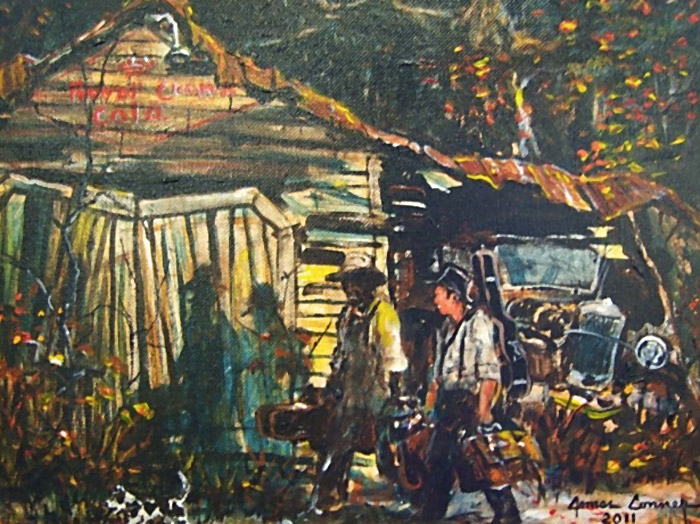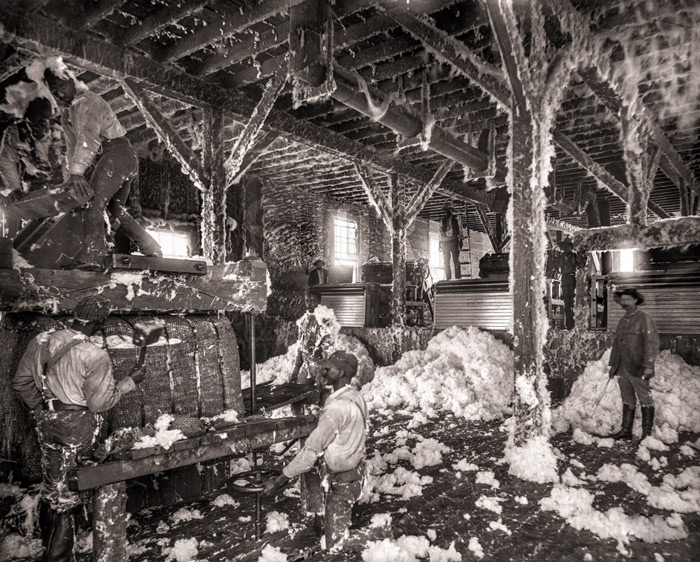Hole in the Clouds
Feb 23, 2010

For the past four years, February vacation for about forty New Yorkers--volunteers from Woodlands Community Temple and Dobbs Ferry Lutheran Church--has meant a thousand-mile trip down to Bay St. Louis, Mississippi, and then a week of hard work amidst the devastation caused by Hurricane Katrina.
Josh Berlowitz, shown here working the ropes last week to pull down the roof truss from a house that couldn't be salvaged, has joined the group every February, clearing debris and helping to build new houses in a coastal community that lost everything in 2005. Katrina hit Bay St. Louis dead on. The day after the storm, levees failed in New Orleans, ruining the city, but Bay St. Louis was already beyond ruination by then, virtually obliterated by wind that tore off almost every roof and a storm surge that flooded every home.
In 2010, life is nowhere near back to normal. New homes are being built--high on stilts this time--but many people still have no permanent place to live, and not all the ruined buildings have yet been torn down. The obvious question is why the biggest, wealthiest country on earth cannot restore these communities. Josh and the other volunteers of Mississippi Mitzvot, some as young as thirteen, some close to seventy in age, are tackling the problems as best they can, year after year.
And this year, February vacation coincided with Mardi Gras. And the Saints won the Super Bowl. Who dat?
Josh Berlowitz
Woodlands Community Temple
Dobbs Ferry Lutheran Church
Bay St. Louis
Mississippi
Katrina
Dec 5, 2012
 Music Pals For a Lifetime, by James Conner.
Music Pals For a Lifetime, by James Conner.
Conner grew up in rural Noxubee County, Mississippi, where he learned to draw from correspondence lessons off the back of a matchbook. He left Mississippi after high school, first for Vietnam and then for about twenty years in Detroit, where he worked as a police sketch artist. But the downward spiral of layoffs that was crushing Detroit eventually reached into the police force and claimed Conner's job.
He was devasted, he said, until he realized that losing his job meant he could finally go home. He'd been homesick his whole adult life, missing Mississippi.
He was no longer young by the time he got back home, but he married and started a family and went back to school, studying art at the University of Mississippi. He taught art for a while, then took the plunge and became a fulltime painter. He said he was trying to become the black Grandma Moses.
Like Grandma Moses, he is drawn to images from his rural childhood. He seems homesick still for his southern roots. But unlike Grandma Moses, Conner is a trained artist with a twenty-first-century eye, and he is a black artist, with a complicated relationship to southern experience.
In this painting and many others, young men carrying guitar cases venture out into the world. In some of the paintings, they travel, perform, try to make something of themselves. In some, they are headed back home again, for whatever reasons. In at least one of Conner's works, the man with the guitar is stuck in the crossroads. I like this picture; the guys with guitars have places to go, dreams to work out, and probably hard times ahead, but at least they've got each other.
Tuscaloosa
Alabama
Detroit
Mississippi
James Conner
Noxubee County
Mar 22, 2016
 Under a bench at a gas station near Meridian, Mississippi, Al made a new friend.
Under a bench at a gas station near Meridian, Mississippi, Al made a new friend.
dog
Allen
Mississippi
child
pet
(Image credit: Norman Stein)
Apr 13, 2016
 In the fall of 1898, these men were hard at work in a cotton gin in Bolivar County in north Mississippi.
In the fall of 1898, these men were hard at work in a cotton gin in Bolivar County in north Mississippi.
1898 was a depression year; cotton was selling for barely 5 cents a pound. Out in the fields, the wages for cotton pickers had dropped from the going rate in the early 1890s of about 50 cents per hundred pounds, which was what an average adult could pick in a day, down to 42 cents.
But most cotton in those years was grown not by wage laborers but by tenant farmers or sharecroppers. Tenants paid plantation owners about 2 bales of cotton (1,000 pounds) each year for a 40-acre plot; sharecroppers split the crop with the landowner, 50-50 or 25-75, depending on who provided the mule and who provisioned the family till the crop came in.
This lazy researcher was not readily able to learn how much the gin workers were paid, but we can be sadly certain that it was not much.
Mississippi
work
delta
working
1898
cotton gin
Bolivar County
(Image credit: Detroit Photographic Co. via Shorpy)

 Music Pals For a Lifetime, by James Conner.
Music Pals For a Lifetime, by James Conner. Under a bench at a gas station near Meridian, Mississippi, Al made a new friend.
Under a bench at a gas station near Meridian, Mississippi, Al made a new friend.